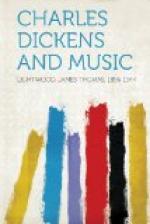I.—National Songs
There are numerous references to ‘Rule Britannia.’ Besides those mentioned elsewhere we have the picture of little David Copperfield in his dismal home.
What evenings when the candles came, and I was expected to employ myself, but not daring to read an entertaining book, pored over some hard-headed, harder-hearted treatise on arithmetic; when the tables of weights and measures set themselves to tunes as ‘Rule Britannia,’ or ‘Away with Melancholy’!
No wonder he finally went to sleep over them!
In Dombey and Son Old Sol has a wonderful story of the Charming Sally being wrecked in the Baltic, while the crew sang ‘Rule Britannia’ as the ship went down, ’ending with one awful scream in chorus.’ Walter gives the date of the tragedy as 1749. (The song was written in 1740.)
Captain Cuttle had a theory that ‘Rule Britannia,’ ’which the garden angels sang about so many times over,’ embodied the outlines of the British Constitution. It is perhaps unnecessary to explain that the Captain’s ‘garden angels’ appear in the song as ‘guardian angels.’
Mark Tapley, when in America, entertained a grey-haired black man by whistling this tune with all his might and main. The entry of Martin Chuzzlewit caused him to stop the tune
at that point where Britons
generally are supposed
to declare (when it is whistled)
that they never,
never, never—
In the article on ‘Wapping Workhouse’ (U.T.) Dickens introduces the first verse of the song in criticizing the workhouse system and its treatment of old people, and in the American Notes he tells us that he left Canada with ’Rule Britannia’ sounding in his ears.
‘British Grenadiers,’ said Mr. Bucket to Mr. Bagnet, ’there’s a tune to warm an Englishman up! Could you give us “British Grenadiers,” my fine fellow?’ And the ‘fine fellow,’ who was none other than Bagnet junior (also known as ’Woolwich’), promptly
fetches his fife and performs the stirring melody, during which performance Mr. Bucket, much enlivened, beats time, and never fails to come in sharp with the burden ‘Brit Ish Gra-a-anadeers.’
Our national anthem is frequently referred to. In the description of the public dinner (S.B.S. 19)—
‘God Save the Queen’ is sung by the professional gentlemen, the unprofessional gentlemen joining in the chorus, and giving the national anthem an effect which the newspapers, with great justice, describe as ‘perfectly electrical.’
On another occasion we are told the company, sang the national anthem with national independence, each one singing it according to his own ideas of time and tune. This is the usual way of singing it at the present day.
In addition to those above mentioned we find references to ‘The Marseillaise’ and ‘Ca ira,’ both of which Dickens says he heard in Paris. In Little Dorrit Mr. Meagles says:




